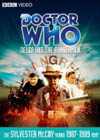DVD Extras include:
Though this is primarily an Earth-bound story (and is, in fact, the ONLY time Melanie appears on Earth with the Doctor), it nicely includes bits on alien planets and a galactic tollport that we assume to be part of some kind of space station. The TARDIS gets some good action in this opener, even if interior scenes are a bit skimped on due to production oddities: Part One gives us the bare minimum, while an interior scene for Burton and Ray in Part Two is conspicuous by its absence.
Vacation Flight of the ChimeronThe title of the story apparently went back and forth between "Delta and the Bannermen" and "Flight of the Chimeron" several times, and I have to say I think they ultimately chose the less exciting of the two possibilities. "Flight of the Chimeron" sounds cool and quite intriguing, and would also work well with the alternate story direction I had been hoping for. "Delta and the Bannermen" doesn't sound right as a story title, and perhaps emphasizes elements of the story that shouldn't have been focused on quite as much.A lot of good elements combine to make Part One the success that it is. The journey to Earth that most of the extra-terrestrials share with the viewer provides a great backbone for the story's action and its humour, while properly showcasing Doctor Who's interstellar scope and offering many opportunities for eye-candy effects. Although a lot of the effects are done well and satisfy, we once more have to put up with a lack of stars behind the trajectory of any moving objects in space, a repeat of a problem from "Time and the Rani" (story no. 148). Of course, proper laser beams would add another level of excitement to the shootouts, even if the spark charges already have a good energy and are well-directed as is. There's also a misleading edit early on, with Melanie just outside the TARDIS begging the Doctor to agree to go to Earth, and then cutting to a shot of a police box in a grassy field, which Weismuller and Hawk will soon approach. It gives the impression that the Doctor and Melanie have already come to Earth, and we missed it, and there will be humour afoot as the two American characters mistake the time/space machine for a regular phone box. But this time, the joke's on the viewer, and it doesn't seem like the production team intended it. This police box is actually just supposed to be a police box, which we eventually realize after cutting back to the toll station and discovering the TARDIS is still there with our two regulars. Ideally, Weismuller and Hawk should find a regular phone booth to make their calls from, and I can only imagine the production team thought they could save themselves from having to build a period prop by having their TARDIS prop do double duty. Arrgh. Even in 1959, a police box looks too incongruous in the middle of a grassy country clearing. Weismuller and Hawk also seem to be extraneous to both the story and to NASA operations, making one wonder why they're on screen here at all. They seem more interested in their accents and American idioms than in their mission or in enjoying life in the Welsh countryside. But these minor glitches are quite minor considering Part One's offerings. Two more threads dominate here and appear to be steering the adventure towards classic status. Firstly, the story looks like it's setting itself up to be a grand parody of just how bizarre things can be when one goes off on holiday, and what a wide variety of strange people one can encounter. Although it all began with the initial travel to one's destination, it looks all set to continue through the stay and include the return journey. The Chimeron Queen Delta and Gavrok's Bannermen pursuing her are an exciting, action-providing part of a greater web of interesting struggles and character types. The mysteriously quiet Keillor with his sideburns and sunglasses adds nicely to the anticipation of a wider variety of intrigue to unfold.... Secondly, we get the archetypal challenge of a love triangle, with a lot of focus going to Sara Griffith's endearing and sympathetic portrayal of Ray on the unrequited end of it. Additionally, we see our main character the Doctor spending a lot of time empathizing with her, making one wonder if he isn't going to make helping her out one of his main aims in this story. By contrast, the other two participants in the triangle, Billy and Delta, are considerably bland in portraying any emotional chemistry towards each other. Thus, the audience easily invests in Ray's struggle, and anticipation is built to see it through to success at the end. In fact, all this is pretty much on par with a successful ensemble romantic comedy, mirroring the kind of character arcs found in movies like "Carry On Abroad" or "Carry On Cruising", while Doctor Who's sci-fi elements can allow the bizarreness to reach more exaggerated extremes. The fun continues with ear-candy, as a lot of period rock and roll songs are showcased during Part One's enjoyable dance sequences. Topping off Part One is a double cliffhanger abounding in threats and unanswered questions. Fantastic!
We also seem to be ending up with a lot of short scene snippets with characters talking to each other, yet being unable to get to the point and communicate. Weismuller and Hawk's first encounter with the Bannermen is a prime example. The characters wind up running around a lot in these later two episodes, often covering the same ground twice, and it's easy to lose track of what they're aiming to accomplish much of the time. Although Ray seems visibly affected by her situation with Billy, this subplot is just treading water at this point, waiting for its disappointing, lukewarm final scene. We learn a lot about Delta's species in these later two episodes, which is generally good sci-fi exploration. It's done in a very unusual way this time though, since half of it is Goronwy the Bee Keeper talking to the two Americans, or whoever else he can find who'll listen, about what makes bees tick, and then we cut to Delta and company who end up doing something similar now that the audience has been primed to believe it and can more easily take it in. It has an almost Japanese subtlety of inferring ideas that are not explicitly said, which has merit. But this time around, it seems to require a lot of extra characters to get the point across, and isn't involving the Doctor and his companion as much as would be ideal. But the more we find out how alien and/or bee-like Delta's species is, the less it seems to make sense for Billy to be falling for her. I often chuckle thinking he'll get a good shock if, as with some species of fish we have here on Earth, Delta's honeymoon activities are limited to laying her eggs somewhere safe, and THEN asking Billy to follow and fertilize them in her absence. Additionally, if he's going to chow down on the "royal jelly" meant for Delta's heirs, he might turn into a queen himself. Lovely. It's easy to imagine the audience not getting on side with this pairing, or even figuring out how to take it. It is said that Delta's species needs males.... considering the cruder look of males in the opening, I wouldn't be surprised if they were haploid like bee drones - having only one set of chromosomes instead of two. As with bees, the queen should be able to produce drones without mating. Of course repopulating a species would require a good size gene pool with as much variation as possible, but even with Billy, there still isn't enough to satisfy that requirement. But rather than truly explore these bizarre possibilities, or actually show any kind of emotion developing between Billy and Delta, their pairing is all clumsily plunked down as the only "right" thing to do to save Delta's species. Somehow, I'm just not convinced. If only Billy could become unconvinced as well, he might notice that Ray's actually worth considering, and let this tale deliver an ending that satisfies the archetypal threads it has brought up. Alternatively, perhaps Ray could discover someone else with a bit more of a brain, and have her happy ending that way.
The story keeps the Doctor in the proper hero mode for its final moves, also managing to use the action to help illustrate one of the points it brought up earlier. Not bad at all. Is this a better story than "Time and the Rani"? It certainly contains a higher percentage of quality scenes, and can undoubtedly make more enjoyable viewing and listening. But when all is said and done, it is less memorable and has been less of an event in the Whoniverse. Don Henderson added very appropriate nuances to his character Gavrok with the idea of him gnawing on raw meat during his confrontation with the Doctor, but sadly this lasting image of him does not inspire the desire for repeat viewing, nor is Gavrok's simpleton desire to wipe out the Chimerons very interesting. By contrast, a renegade Time Lady like the Rani hatching a more complex sci-fi idea to drive a plot remains more interesting, even if portions of it turn out a bit dodgier on screen. Additionally, Gavrok has his best confrontations with Delta and the Doctor in early episodes, while the Rani saves her best confrontations with the Doctor for the final episode. Thus, "Time and the Rani" still ends up with a stronger "main event" at its climax, plus the additional event of the change of Doctor earlier in the story, which allows it to continue to inch ahead in my rankings. If only "Delta and the Bannermen" had continued to satisfy with the more interesting threads showcased in its first episode, the ranking might be very different.
International Titles:Deutsch: "Delta und die Bannermänner"Magyar: "Delta és a bannermenek"Français: (Delta et les Bannermen)Русский: "Дельта и знаменосцы"The word "banner" is virtually identical in German, so they seem to have comfortably stuck to a literal translation on this occasion. The Russian translation also remains literal, as they dug into the meaning of the words and came up with "standard bearers". The Hungarians seem to have guessed that "bannermen" was just a crazy name for this group of mercenaries that they could copy... but perhaps they didn't realize that it was already plural in English, and then went and pluralized it again!
This story is available on DVD and VHS video. Click on the Amazon symbol for the location nearest you for pricing and availability:
Comments on this article are welcome. You may contact the author from this page:
|









